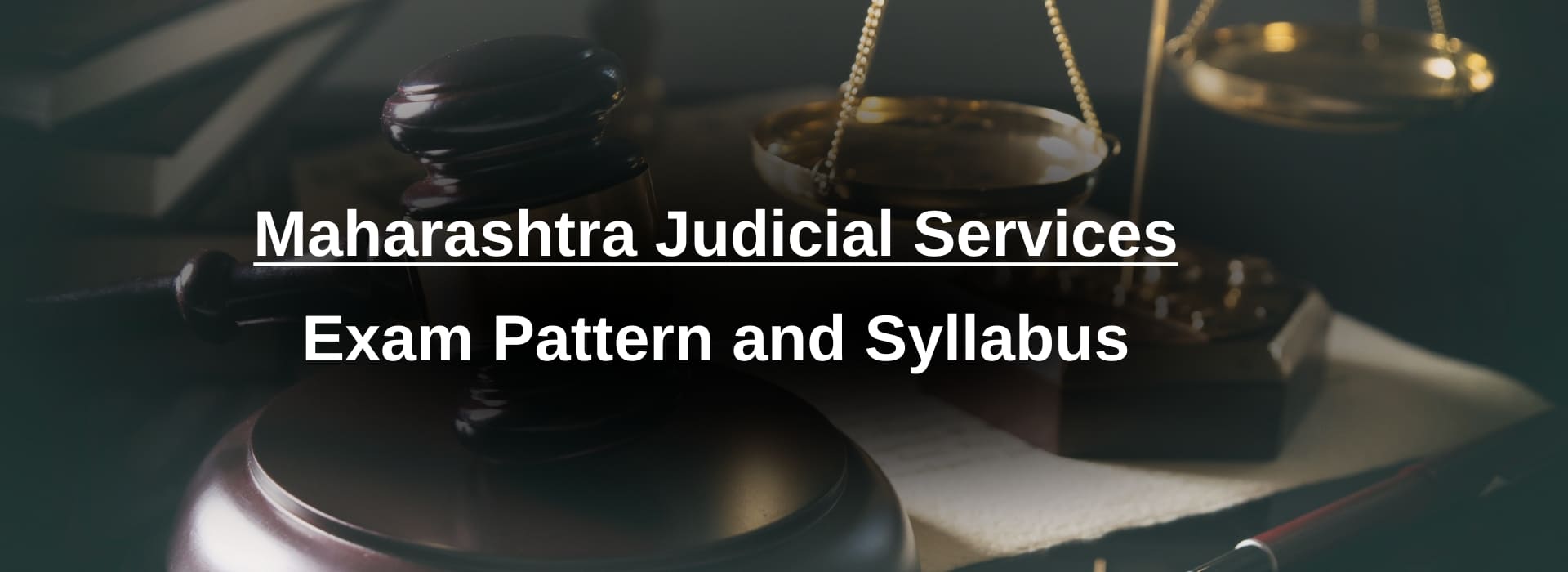
Maharashtra Judiciary Exam 2024 [JMFC Syllabus]
The Maharashtra Judiciary Exam, also known as the Maharashtra Judicial Services Exam or the Maharashtra Civil Judge (Junior Division) and Judicial Magistrate (First Class) Exam, is a competitive exam run by the Maharashtra Public Service Commission (MPSC).
If you're preparing for the exam, it's important to understand the Maharashtra Judiciary Syllabus for 2024. The exam has three stages: Prelims, Mains, and the Interview. Each stage has a different syllabus, but there are subjects that overlap between the Prelims and Mains. So, you can prepare for both at the same time for those common subjects.
In this article, we’ll go over:
- The Maharashtra Judiciary Syllabus for 2024.
- How to plan your strategy based on the syllabus.
- How to prepare for both Prelims and Mains together for the common subjects.
Maharashtra Judiciary Syllabus 2024
The Maharashtra Judiciary exam has three stages: Prelims, Mains, and the Interview. The syllabus for each stage is different, but since some subjects are the same in both Prelims and Mains, you can study those subjects together to save time.
Maharashtra Judiciary Prelims Syllabus 2024
Here are the subjects that will be asked in the Prelims exam for 2024:
- Code of Criminal Procedure
- Civil Procedure Code
- Evidence Act
- Transfer of Property Act
- Specific Relief Act
- Maharashtra Rent Control Act
- Limitation Act
- Constitution of India
- Indian Penal Code
- Law of Contract
- Sale of Goods Act
- Indian Partnership Act
Prelims Exam Details:
- Exam Type: Multiple-choice questions
- Total Marks: 100
- Medium: English
Maharashtra Judiciary Mains Syllabus 2024
The Mains exam consists of two papers. Here are the details:
Paper 1:
- Civil Procedure Code
- Transfer of Property Act
- Specific Relief Act
- Law of Contract
- Sale of Goods Act
- Partnership Act
Paper 2:
- Indian Penal Code
- Evidence Act
- Code of Criminal Procedure
- Scheduled Caste and Scheduled Tribe (Prevention of Atrocities) Act, 1989
- Protection of Civil Rights Act, 1955
- A Legal Essay on Current Affairs (about 800 words)
Exam Type:
- Written (Descriptive)
- Total Marks: 200 (100 marks for each paper)
- Medium: Marathi and English
Common Subjects to Prepare for Prelims and Mains
There are 10 subjects that overlap between Prelims and Mains. These are the subjects you should focus on for both exams:
- Civil Procedure Code
- Transfer of Property Act
- Specific Relief Act
- Law of Contract
- Sale of Goods Act
- Partnership Act
- Indian Penal Code
- Evidence Act
- Code of Criminal Procedure
Note that there is no set mark distribution for Prelims and Mains, so the weightage of each subject depends on the Maharashtra Public Service Commission's discretion.
Be sure to refer to the official notification for all the details about each stage of the exam and the 2024 syllabus.
How to Prepare for Prelims and Mains Together
Since there are common subjects between Prelims and Mains, it’s a good idea to prepare for both at the same time. If you don't, you might not have enough time to prepare properly for Mains after the Prelims exam.
Here are some tips to prepare for both exams together:
- Understand the Exam Pattern and Syllabus: First, get familiar with the exam pattern and syllabus for both Prelims and Mains. The Prelims is objective (multiple choice), while the Mains is descriptive.
- Create a Study Schedule: Make a study plan that covers both the Prelims and Mains syllabus. Set aside time for each subject and include regular revisions and mock tests.
- Gather Study Materials: Collect the right study materials such as textbooks, reference books, previous year question papers, and online resources. For Prelims, focus on objective-type questions and mock tests.
- Subject-wise Focus: Prioritize your time based on the importance of each subject. For Mains, focus on general knowledge, current affairs, criminal law, and civil law. For Prelims, focus more on civil law, criminal law, and other key subjects.
- Take Notes: Make organized notes for each subject, highlighting key points, important cases, and legal provisions. Update your notes regularly.
- Practice Mock Tests and Previous Papers: Solve past years’ question papers and mock tests for Prelims to improve your time management and question-solving skills. For Mains, practice writing answers within the time limit to improve your writing skills.
- Time Management: Plan your time wisely to cover both the Prelims and Mains syllabus. Focus more on subjects you find harder or need more practice with.
- Revision: Regularly revise what you've studied to retain the information better. Create a revision schedule and keep quick-reference notes handy for last-minute review.
- Stay Informed: Keep yourself updated with current affairs, legal news, and important cases. These topics may come up in both Prelims and Mains.
- Seek Guidance: If possible, join a coaching institute specializing in judiciary exam preparation. Experienced mentors can guide you and provide study materials.
- Stay Healthy and Manage Stress: Take care of your health by eating well, exercising, and getting enough sleep. Use stress-management techniques like relaxation, meditation, or yoga to stay calm.
Conclusion
Cracking the Maharashtra Judiciary Exam requires hard work, consistency, and a good understanding of the exam's structure. Stay patient with your preparation and stay focused on your goal. If you create a solid study plan and stick to it, you can succeed in the Judiciary Exam. Start preparing today for the Maharashtra Judiciary Exam 2024.
Good luck!